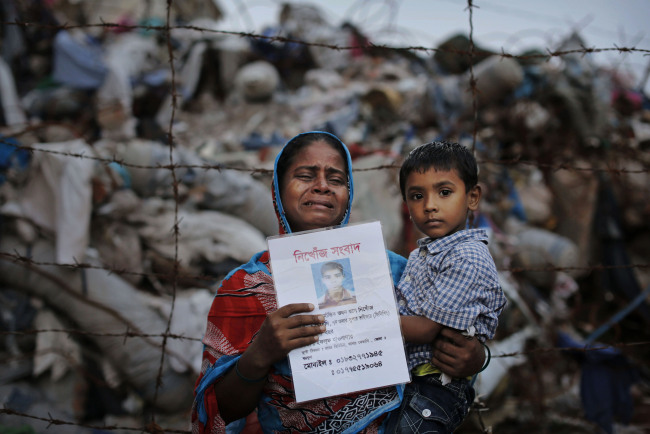DHAKA (AFP) ― Seventy top retailers pledged to open up their Bangladesh factories to safety inspections within nine months as part of a pact finalized Monday in the wake of a deadly garment factory collapse.
The mainly European brands will underwrite repairs and renovations if inspections reveal their factories to be unsafe, according to the legally binding agreement, signed with unions after the collapse of Rana Plaza in April killed 1,129 people in one of the world’s worst industrial disasters.
“Initial inspections at every factory will be completed at the latest within nine months, and plans for renovations and repairs put in place where necessary,” the pact’s steering committee said in a statement.
 |
A woman holds a picture of her son, a garment worker who went missing following the collapse of the Rana Plaza building in Savar, Dhaka, Bangladesh, June 14. (AP-Yonhap News) |
Labor umbrella groups, including Swiss-based IndustriALL and UNI Global Union, stepped up pressure on Western retailers to sign the agreement after the nine-storey building in Dhaka crumbled on April 24.
Retailers, including Inditex, H&M and Primark, started agreeing to the Accord on Fire and Building Safety in May to improve shocking factory conditions in Bangladesh, the world’s second biggest apparel exporter, with clothing accounting for 80 percent of its shipments.
“The terms of reference and the rules of the accord are set in place, we can now identify the best people and put together the team in Bangladesh who will be charged with carrying out this vital work,” UNI Global Union General Secretary Philip Jennings said.
Retailers will submit details of their factory suppliers in Bangladesh by July 15 which will then be publicly released, said the statement, giving details of the new accord.
A team of inspectors aim to “identify grave hazards and the need for urgent repairs” at the factories. Retailers must commit for two years to the garment plants flagged for safety improvements, the statement said.
A headquarters to oversee implementation of the pact will be set up in the Netherlands, it said.
The task of inspecting and improving factories could prove hugely daunting.
A survey by a prestigious Dhaka-based engineering university last week found nine out of 10 Bangladeshi garment plants are risky structures, and many were built without qualified engineers.
It is not clear how much retailers are ready to spend on repairs, but a study by a local group has found the cost of renovations and retrofitting Bangladesh’s garment factories could cost $3 billion.
While leading European retailers have joined the agreement, American brands such as Wal-Mart and Gap have snubbed the accord and opted for self-regulation.
Wal-Mart, the world’s largest retailer and one of Dhaka’s top buyers, has promised to inspect its Bangladeshi suppliers and publish the results, while Gap says it launched its own drive last October.
The Bangladesh Garment Manufacturers and Exporters Association, which represents 4,500 garment factories, initially welcomed the accord, saying it reflected the retailers’ long-term commitment to the country.
In recent weeks, however, manufacturers have criticized the organizers, saying the government and the factory owners should have been brought on board.
“They should have definitely included the BGMEA and the knitwear manufacturers in the accord and its decision-making bodies. After all, it’s our factories they are going to inspect,” BGMEA vice-president Reaz-Bin-Mahmood told AFP.
Scott Nova, head of the U.S.-based Worker Rights Consortium, told AFP the BGMEA was not included because “this agreement is focused on the responsibility of the brands to ensure that factories are made safe.”




![[Weekender] Korea's traditional sauce culture gains global recognition](http://res.heraldm.com/phpwas/restmb_idxmake.php?idx=644&simg=/content/image/2024/11/21/20241121050153_0.jpg)



